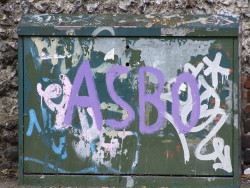 New powers have recently been handed over to a number of different local authorities – including the police, landlords of social housing, and town and district councils – to provide a new approach to anti-social behaviour. These new regulations have been introduced to try to empower victims and to make communities safer.
New powers have recently been handed over to a number of different local authorities – including the police, landlords of social housing, and town and district councils – to provide a new approach to anti-social behaviour. These new regulations have been introduced to try to empower victims and to make communities safer.
Anti-social behaviour is an umbrella term which includes a range of different criminal acts. It can include incidents of littering, graffiti and vandalism, drunken disorderly activity, noise pollution complaints, and generally threatening behaviour. All these types of behaviour, either as one-off incidents or as continued anti-social patterns of conduct, can have a serious emotional impact on individual victims and whole communities. In order to deal more effectively with instances of anti-social behaviour, the government passed the Anti-Social Behaviour, Crime and Policing Act in 2014 to better protect victims and their communities from serious harm.
To provide better protection for victims and communities, the government has introduced a series of new processes which provide simpler, more effective powers to tackle anti-social behaviour. In order to do this, a variety of different measures have been brought into action. These include:
New Criminal Behaviour Order
If a person is convicted of a criminal offence, then the courts can issue this order. The new legislation allows the courts to add certain requirements and conditions to the sentence of a convicted person. This can include being denied entry to some public spaces or not being allowed to participate in a particular community activity. Courts are also allowed to make attending a drug treatment programme part of the conditions for release if necessary. If the person in question does not comply with these requirements, then they could end up facing up to five years in prison for each breach.
Community Protection Notice
This gives local authorities and police the power to put an end to anti-social behaviour which has an environmental impact and which has been ongoing for a period of time. Offences such as graffiti incidents, noise complaints and fly-tipping fall into this category.
Public Spaces Protection Order
This order allows local governments to effectively handle a more widespread problem in a particular public space by putting in restrictions surrounding the use of that area. For example, local councils can make parks and public spaces alcohol-free zones if there is cause to do so.
Police Dispersal Power
Police officers have been given powers to disperse groups of people behaving anti-socially and to confiscate any relevant items. This means that the police can act in a preventative manner and can stop anti-social behaviour from developing into a more severe case of criminal behaviour.
Closure Power
This is a brand-new power which gives the police and the local authorities the right and the ability to shut down local premises or establishments which are either promoting or encouraging anti-social behaviour or which have a history of being a site of anti-social behaviour in the past.
Another very important part of these new regulations is giving the victims a chance to have their say in how the community chooses to deal with anti-social behaviour. Two principal measures will facilitate this:
- Community Trigger: This new measure allows victims of anti-social behaviour to demand action against those responsible. This starts simply with a review of the case but will then be escalated if there are grounds for action.
- Community Remedy: This is a way for the victims or the local community affected by instances of anti-social behaviour to have their say in an alternative punishment if the case is settled out of court. This option is reserved solely for low-level crimes.
These new measures have been brought in to make it much easier for communities and local authorities to tackle instances of anti-social behaviour in their local area. The measures are focused on the victims, letting them have their say in the process, and have been established to make dealing with anti-social behaviour quicker and less bureaucratic in nature.

